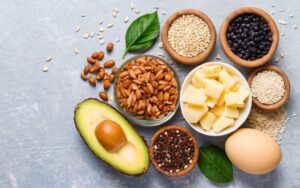Ketogenic Diet: The ketogenic diet, commonly known as the keto diet, has gained significant attention in recent years due to its potential health benefits. In this comprehensive guide, we’ll explore the fundamental principles, foods, benefits, and potential risks associated with this dietary approach.
The ketogenic diet, often called the keto diet, is a way of eating that focuses on eating low amounts of carbohydrates and high amounts of fats. This change in diet puts your body into a state called ketosis. Ketosis happens when your body burns fat for energy instead of carbohydrates, making molecules called ketones as a result.
The main idea of the keto diet is to eat very few carbs while increasing the amount of fat you eat. When you eat fewer carbs, your body’s insulin levels drop, which tells your body to start using stored fat for energy. This shift in how your body gets energy can lead to weight loss and might also help with things like controlling blood sugar levels and managing certain medical conditions like epilepsy.
On the keto diet, people focus on eating healthy fats like the ones in avocados, nuts, seeds, and olive oil. They also eat moderate amounts of protein from foods like meat, fish, and eggs. Additionally, they include low-carb vegetables such as spinach, broccoli, and cauliflower in their meals.
While the keto diet has potential benefits, it’s important to be careful and talk to a healthcare provider before starting it. It might not be right for everyone. There are some risks, like not getting enough of certain nutrients, feeling sick when you first start (called the “keto flu”), and not knowing how it might affect your health in the long run.
What Is the Ketogenic Diet?

The ketogenic diet is a low-carb, high-fat eating plan designed to shift your body’s metabolism away from relying on carbohydrates as its primary energy source. Instead, it encourages the utilization of fats for energy production. Here are the key points about the keto diet:
Definition and Purpose
- The keto diet restricts carbohydrate intake to induce a state called ketosis.
- Ketosis occurs when the body burns fat for fuel, producing ketones as an alternative energy source.
Historical Context
- The ketogenic diet has roots in the early 20th century when it was used to manage epilepsy.
- Over time, it has gained popularity beyond epilepsy treatment, with claims of weight loss, improved insulin sensitivity, and other health benefits.
Principles of the Keto Diet
The ketogenic diet, often referred to as the keto diet, is a low-carb, high-fat dietary approach that shares similarities with the Atkins and low-carb diets. Here are the fundamental principles:

- Carbohydrate Restriction
- The keto diet involves drastically reducing carbohydrate intake.
- Typically, it contains only 10% carbs, while fat makes up 70% of the diet, and protein constitutes 20%.
- Metabolic State: Ketosis
- By limiting carbs, the body enters a state called ketosis.
- During ketosis, the body becomes highly efficient at burning fat for energy.
- The liver converts fat into ketones, which serve as an alternative energy source, especially for the brain.
- Health Benefits
- Ketogenic diets can lead to significant reductions in blood sugar and insulin levels.
- Increased ketone production has potential health benefits.
Foods Allowed on the Keto Diet

On the Ketogenic Diet, it’s important to select foods that fit its guidelines. Here are some key food groups to focus on:
Healthy Fats
Avocado: Known for its rich healthy fats and fiber content.
Nuts and Seeds: Options like almonds, walnuts, chia seeds, and flaxseeds are great choices. Olive Oil: This oil is commonly used for cooking and in salads due to its health benefits.
Low-Carb Vegetables

Spinach: Packed with essential vitamins and minerals, it’s a nutritious option. Broccoli: Low in carbohydrates and high in fiber, making it an excellent choice.
Cauliflower: Versatile and low in net carbs, it can be used in various dishes.
Protein Sources

Meat: Choose lean cuts of grass-fed beef, chicken, turkey, or pork for protein. Fish: Opt for fatty fish like salmon, mackerel, and sardines for their healthy fats.
Eggs: A fantastic source of both protein and healthy fats, making them a staple in many keto diets.
Benefits of the Keto Diet
The keto diet, also known as the low-carb, high-fat diet, offers several health advantages. Here are some key benefits:
Weight Loss

- The keto diet is widely recognized for its effectiveness in weight loss.
- Studies consistently show that people on low-carb diets lose more weight, especially in the initial weeks, compared to those on low-fat diets.
- The reduction in appetite and calorie intake contributes to this weight loss.
Abdominal Fat Reduction
- Not all fat in the body is the same. Visceral fat, which accumulates around organs, is associated with inflammation and insulin resistance.
- Low-carb diets effectively reduce harmful abdominal fat, potentially lowering the risk of heart disease and type 2 diabetes.
Improved Metabolism and Hunger Control
- The keto diet shifts the body from using glucose (from carbs) to using ketones (from fat) for energy.
- This metabolic switch leads to increased metabolism, reduced hunger, and improved muscle mass.
Potential Health Benefits
- Beyond weight loss, the keto diet may offer benefits against diabetes, cancer, epilepsy, and Alzheimer’s disease.
- It can improve blood sugar levels, manage acne, and enhance heart health.
Potential Risks and Considerations in keto diet
While the ketogenic diet offers potential benefits, it’s crucial to consider potential risks and challenges:
- Nutrient Deficiencies: Because the keto diet restricts many food groups, including fruits, grains, and some vegetables, there is a risk of nutrient deficiencies, particularly in essential vitamins and minerals like vitamin C, potassium, and magnesium.
- Keto Flu: Some individuals may experience symptoms like headaches, fatigue, nausea, and irritability when transitioning to the keto diet, a phenomenon known as the “keto flu.” These symptoms typically subside within a few days to weeks but can be disruptive initially.
- Long-Term Effects: Long-term adherence to the keto diet may pose unknown risks, as research on its effects over extended periods is limited. Potential concerns include the impact on cardiovascular health, bone health, and overall nutritional adequacy.
Considering these potential risks, it’s essential to approach the keto diet with caution and under the guidance of a healthcare professional, especially for individuals with underlying health conditions or specific dietary needs. Regular monitoring and adjustments may be necessary to mitigate potential risks and optimize health outcomes.
Conclusion
In conclusion, the ketogenic diet presents a unique approach to weight loss and potential health benefits such as improved insulin sensitivity and epilepsy management. However, it’s important to carefully consider potential risks and challenges, including nutrient deficiencies, the keto flu, and unknown long-term effects. As with any dietary regimen, consulting with a healthcare professional is essential to ensure safety and effectiveness, particularly for individuals with underlying health conditions. By balancing the benefits and risks and adopting a personalized approach, individuals can make informed decisions about incorporating the ketogenic diet into their lifestyle.
Disclaimer
Please note that the details shared in this article aim to give you a basic understanding of the ketogenic diet, also known as the keto diet. While we’ve done our best to provide accurate and reliable information, it’s important to recognize that this content is not meant to replace advice, diagnosis, or treatment from a qualified healthcare professional. If you’re thinking about trying the keto diet, it’s essential to talk with your doctor or a healthcare provider first.

